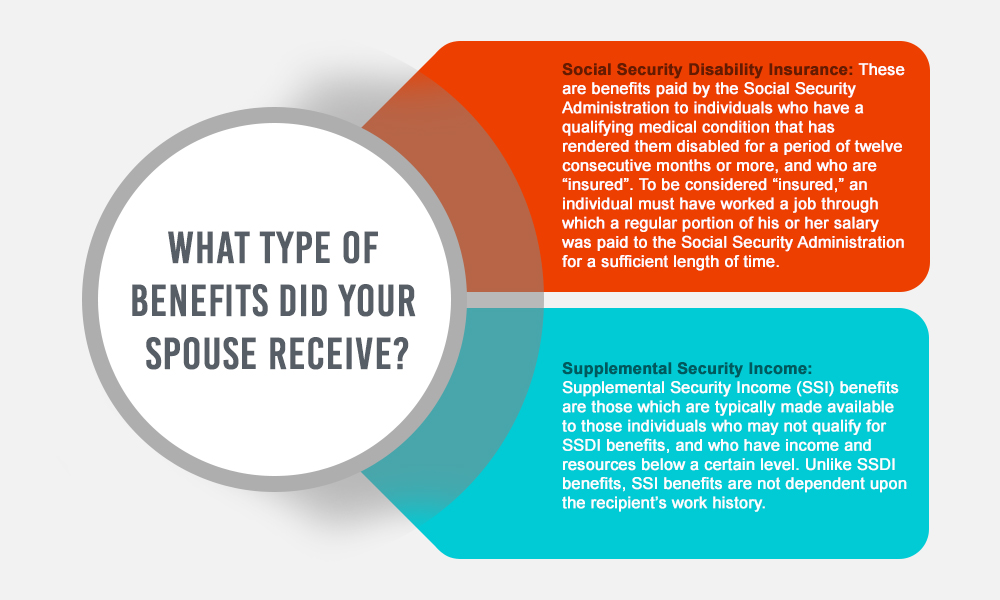The loss of someone you love is incredibly painful. There’s no question about it. Grief can be a long, and difficult journey. At Liner Legal, we understand those feelings. We sympathize with the deep pain and loss that many of our clients have experienced. We also know that even in the midst of sadness and pain, life keeps moving on, and you have to keep moving forward.
As you do, you’ll need to provide for yourself, and for those you love – and you may find yourself wondering how you’ll do that. This can particularly be true if your spouse was receiving retirement or disability benefits that were an important part of your monthly income. As a result, you may find yourself wondering – can a widow or widower receive Social Security disability benefits after a spouse passes away? The good news is, that in many situations, it is possible.

What Type Of Benefits Did Your Spouse Receive?
Generally, there are two types of Social Security disability benefits:
- Social Security Disability Insurance: These are benefits paid by the Social Security Administration to individuals who have a qualifying medical condition that has rendered them disabled for a period of twelve consecutive months or more, and who are “insured”. To be considered “insured,” an individual must have worked a job through which a regular portion of his or her salary was paid to the Social Security Administration for a sufficient length of time.
- Supplemental Security Income: Supplemental Security Income (SSI) benefits are those which are typically made available to those individuals who may not qualify for SSDI benefits, and who have income and resources below a certain level. Unlike SSDI benefits, SSI benefits are not dependent upon the recipient’s work history.
When an individual who was receiving SSDI benefits dies, the money they were receiving may go to their dependents, including a spouse, children, and potentially even elderly dependent parents. These benefits are known as “survivors benefits.”
A qualifying dependent may be able to receive survivor’s benefits in a variety of ways, depending upon your circumstances and the category of eligibility for which you qualify. If, for example:
- You care for a child who is under the age of 16 and who receives SSDI survivor’s benefits from your deceased spouse, you could be eligible for 75% of your deceased spouse’s benefits amount.
- You are at least 50 years old, you are yourself disabled, and your disability began prior to the time that your spouse died, you may receive 71.5% of your deceased spouse’s SSDI benefit.
- You are at least 60 years old but have not yet reached full retirement age, you may receive anywhere from 71.5 to 99% of your deceased spouse’s SSDI benefit.
- You are full retirement age or older, you may receive 100% of your deceased spouse’s SSDI benefit.
In addition, there are a few other factors that may affect that eligibility for survivor’s benefits, including:
- Remarrying: If a survivor remarries before the age of 60 (or 50 if the survivor is also disabled), the survivor generally cannot receive the deceased spouse’s survivorship benefits.
- How long you were married: Generally, a surviving spouse must have been married to the deceased for at least nine months to be eligible for benefits, although there are some exceptions to this rule. Consulting with a knowledgeable attorney on this, and any legal matter is always advised.
- Retirement age: If a widow or widower is of retirement age, the benefits they might receive based on their own work history could be higher than the amount that would be received from the deceased spouse’s SSDI benefits.
- Surviving spouses who work: If a widow or widower continues to work following the death of a spouse, it is possible that monthly SSDI benefits will be reduced depending upon age and earned income. Again, consulting with an attorney is always advised.
Depending upon your unique circumstances, there may be a number of other factors that affect whether you qualify for survivorship benefits, and how much you might receive. As legal matters can often be complex, having the right attorney on your side will be essential.
Liner Legal – Your Social Security Disability Attorneys
Being disabled can be difficult. Losing a loved one, even more so. Legal stress is the last thing you need when you are processing your grief and trying to move forward after a loss. You don’t need the financial headache of wondering how you’ll assert your rights to the benefits you need and deserve. Instead, you can leave those matters to us.
At Liner Legal, we understand Social Security disability law. We have the knowledge and experience you need on your side and a hard-earned reputation for fighting to protect and assert the rights of each and every client we hire. We would be honored to help you too. Give us a call today. We look forward to speaking with you soon.







